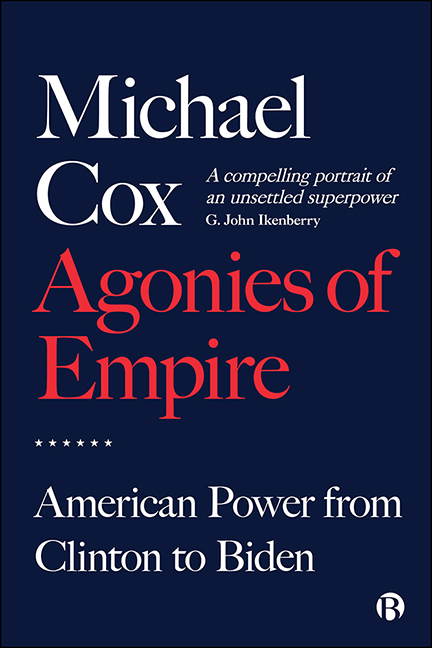Book contents
- Frontmatter
- Dedication
- Contents
- About the Author
- Preface
- Introduction: The Rise of an Empire
- PART I Clinton: Liberal Leviathan
- PART II Bush Jnr: Empire in an Age of Terror
- PART III Obama: Towards a Post-American World?
- PART IV Trump: Turbulence in the Age of Populism
- PART V Biden: Is America Back?
- Notes and References
- Acknowledgements
- Index
4 - American Power after the Towers
Published online by Cambridge University Press: 15 September 2022
- Frontmatter
- Dedication
- Contents
- About the Author
- Preface
- Introduction: The Rise of an Empire
- PART I Clinton: Liberal Leviathan
- PART II Bush Jnr: Empire in an Age of Terror
- PART III Obama: Towards a Post-American World?
- PART IV Trump: Turbulence in the Age of Populism
- PART V Biden: Is America Back?
- Notes and References
- Acknowledgements
- Index
Summary
When Clinton departed the White House, America – and indeed the vast majority of Americans – had never felt so secure. Tragically, not only did this secure world collapse on 9/11, but so too did a number of cosy assumptions, one of the most influential being that under conditions of globalization the propensity for international conflict would more likely diminish than increase. As the terrorist attacks on New York and Washington revealed only too graphically, American-style globalization not only appeared to have as many determined enemies as well-meaning friends, but enemies of a quite novel character. What it also revealed – again to the discomfort of those who assumed the world was becoming a safer place – was that the worst sometimes happens. But even the most imaginative of right-wing conspiracy theorists could not have predicted that a group financed by the multi-millionaire son of one of the richest Saudi families could have carried out an attack which devastated two apparently indestructible buildings in the heart of New York, nearly destroyed the Pentagon and then go on to make a series of ghoulish videos boasting of the fact to loyal followers around the world. It was all too unreal for words.
The president whose responsibility it was to respond to all this was, of course, the inexperienced George W. Bush. Less than hugely popular when he entered the White House, within a few short weeks of the attack he had moved from being what many regarded as the questionable winner of a contested presidential election into becoming America's commander-inchief leading a nation in a war against a dangerous foe. If nothing else, this bolstered his position in the eyes of the American public. But something else changed too: America's willingness to deploy all that hard power it had been storing away in its locker for so many years. Indeed, as America flexed its muscles and launched its deadly response to the initial attack, one pundit was even moved to observe that it was no longer useful to describe the US as a mere ‘superpower’ but rather a veritable ‘behemoth’ strutting its stuff ‘on the planetary stage’. Even that old guru of US decline, Paul Kennedy, had to recant on past intellectual misdemeanours.
- Type
- Chapter
- Information
- Agonies of EmpireAmerican Power from Clinton to Biden, pp. 57 - 62Publisher: Bristol University PressPrint publication year: 2022

